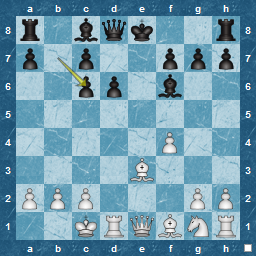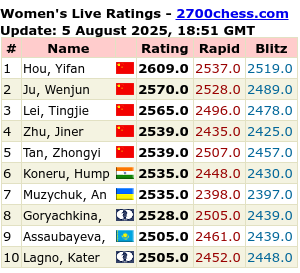T54 began last week and I had the best start possible : a win !
How did I manage this considering I have done very little, chess-wise, in the past 6 weeks ?
Simple really:
1) My opponent made two serious mistakes.
2) I spotted them and took advantage.
3) I thought about the positions in front of me, and played them, rather than react more automatically
I'm pretty certain my opponent had done his homework since he knocked out his initial moves quickly. By the time we reached move 7, he was up to 50 minutes, compared to my 45, and I think he already had his initial plan in mind, which seemed to be a straightforward assault on the f2-square, intending, after my queenside castling
, a knight-fork threat to win a rook.
 |
| 7...Ng4 |
However, is Ng4 a good move here ?
Its true, the White queen has to move ( again ), but if White avoids a "normal" Centre Game move in this position ( ie 8.Qg3 Bh4! ) then you can't really say that Black has gained that much, especially after his follow-ups of Bf6 and Bd4.
Instead of attacking so quickly, isn't Black better off by castling first ? Its certainly the most popular response both in general and in T4545 ( minor interesting sidenote : all TL games with 6...Be7 7.0-0-0 0-0 have also been lost by Black, so maybe Ng4 isn't so bad after all ! )
After building up his attack with Bf6 and Bd4, I'm really not sure why Black retreats with 10...Bd5. I would have thought that 10...Nxe3 11.fe Be5 is much better, as it lands White with doubled pawns ( so in retrospect 10.Nh3 must be preferred to 10. Be3 or even 9.h3 ).
Here's the first major mistake...
 |
| 11. f3 Nf6 ? |
After the first mistake, the first good move !
 |
| 12.f4 ! |
I actually thought about developing moves like Bd3 or Bc4, before it clicked that 12. f4 was a great move.
The Bishop is trapped, but thoughts of Black playing Bxb2+ and the bad position I would be in after Kxb2, held me back from playing it, and I actually spent almost 5 minutes checking this before playing 12.f4, but Black reacted immediately with 12...Nxd5, which is surely not the best reply. Better must be 12...Bxb2+ 13.Kxb2 0-0. Same material down, but better position.
However, Nxd5 "saves" the Bishop, but still it loses material, and even worse, after 13.exd5 Bf6 14.exc6 bc, it leaves an obvious and very useful discovered check along the e-file.
 |
| 14..bc |
Again, I took my time on the next move. The discovered check is obvious, but the question I asked myself was if it was better to delay it, or even if there was a better move, since the discovered check does not automatically win material.
There isn't, and in this case the advantage is positional rather than material.
I exchange queens and bishops ( although a better combination than I played would be the immediate 16.Bxf6 gf 17. Qxe7+ Kxe7 as that gives Black doubled pawns ) and after Black's rather strange Rd8, and Kg7, I have Re7 and a rook on the 7th rank !
Black doesn't do himself any favours with his less active moves that follow and reaching this position seals his fate...
 |
| 23. Re8+ Kg7 24. Ba6 ! Bxa6 25. Rxa8 |
Although I don't find the quickest solutions, relying more on solid moves to gain the Bishop and then the Rook, after I end up with a passed a-pawn and Black a king that is stuck in the wrong half of the board, he resigns.
 |
| 29. a5 Black Resigns |
Although ultimately, Black loses because he is so much material down ( and faces a passed pawn ! ) , I think the cause is actually the exposure of his king through not castling when the opportunity arises ( ie on moves 7, 8 or 9, as well as 14 ) that puts him in such a bad position later on in the game.
I'd have to add that recognising the two main occasions when Black makes obvious mistakes and taking advantage is also a major point in White's win here.
Finally, playing simple moves in the endgame which, although they may not be the best, certainly don't allow Black any serious chance of counterplay, rounds off a decent win.
Looking forward to the next round !


0 comments:
Post a Comment